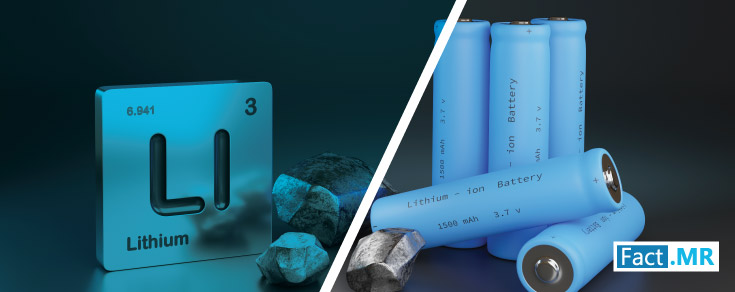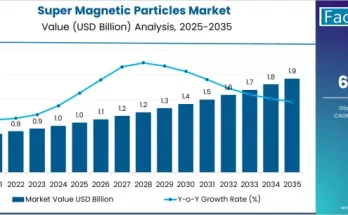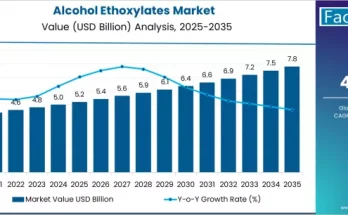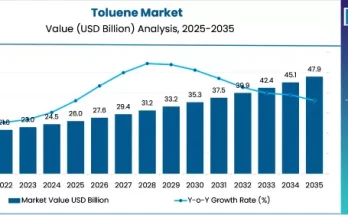Lithium is valued for its high energy density crucial for rechargeable batteries, especially in electric vehicles and electronics. It offers superior energy efficiency, low self-discharge, minimal memory effect, and fast charging capabilities, making it a preferred choice over alternatives for advanced energy storage solutions. As the lightest metal, lithium is crucial for Lithium that power devices like smartphones, electric vehicles, and renewable energy systems. Its high energy capacity allows devices to last longer between charges. Additionally, the lithium industry is growing faster due to lithium’s special properties supporting clean energy solutions, reducing carbon emissions, and promoting a greener future. The lithium market’s role in advancing technology and sustainability is key to our shift towards a cleaner and more electrified world.
As per Fact.MR, the global lithium mining market is valued to be US $ 1.2 Billion in 2023 and the market is anticipated to grow at a CAGR of 6.4% to reach US $ 2.1 Billion by the end of 2033. Various factors such as demand across numerous end-use industries especially pharmaceuticals & electric vehicles, high government investments, and mining projects are expected to boost the growth of the lithium market. Other factors such as the adoption of advanced and sustainable technology for mining are expected to create lucrative opportunities for the market players.
Trends Of Lithium Mining For Batteries
- The increasing use of electric vehicles and renewable energy systems is causing a higher demand for lithium-ion batteries. These batteries are essential for powering electric cars and storing renewable energy. As a result, the need for lithium, a key ingredient in these batteries, is growing, leading to more lithium mining.
- Lithium mining is focusing more on being environmentally responsible. This means using methods that use less water and energy and cause fewer disruptions to nature.
- In 2020, Tesla (NASDAQ: TSLA) signed an agreement with Piedmont Lithium to secure a lithium supply from their project in North Carolina, USA. Piedmont Lithium has highlighted its commitment to sustainable practices, including water management.
- Advanced extraction technologies, such as selective sorbents and direct lithium extraction, are being developed to optimize mining efficiency and reduce environmental impact. As the circular economy gains traction, efforts to recover lithium from used batteries are increasing, reducing the reliance on primary mining.
Key Trends Of Lithium-Ion Battery Manufacturing
- Governments in geographies such as North America are focusing on making batteries at home to lessen the need for imports and build a stronger supply chain. By producing batteries locally, they can avoid disruptions caused by global factors. This approach also brings investments to build battery factories, create jobs, and advance technology.
- Ultium Cells LLC, formed in 2020, is a partnership between GM and LG Energy Solution, a subsidiary of LG Chem. The joint venture involves an investment of billions of dollars to build battery manufacturing facilities in Lordstown, Ohio, and Spring Hill, Tennessee.
- Gigafactories, are being built in the region to make lots of lithium-ion batteries for electric cars and gadgets. These factories are a result of partnerships between carmakers, tech companies, and battery manufacturers. They’re important because they help ensure a steady supply of batteries and lower costs.
- Companies are focusing on developing batteries that can be rapidly charged while maintaining safety and longevity, addressing one of the primary consumer concerns. Moreover, the industry is moving towards more sustainable practices, including recycling and using environmentally friendly materials, to reduce the ecological footprint of battery production.
Competition:
The lithium market competition is becoming very intense due to the growing demand for batteries. Lithium battery companies have begun focusing on diverse sources of lithium, making their own batteries, and improving how lithium is extracted. They’re also working on better battery technology, recycling used batteries, and partnering with others to share knowledge and resources. Companies look to expand to new regions, follow sustainable practices, and keep costs down. It’s all about staying ahead in a fast-changing industry.
- In March 2021, GS Yuasa International Limited (GS Yuasa Corp) achieved the prestigious Toyota Technology and Development Award for their exceptional work in advancing lithium-ion batteries for hybrid vehicles.
- In November 2018, Johnson and Toshiba Corporation collaborated to provide low-voltage lithium-ion solutions aimed at enhancing efficiency in the same domain.



